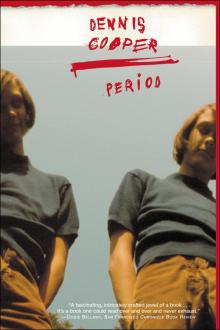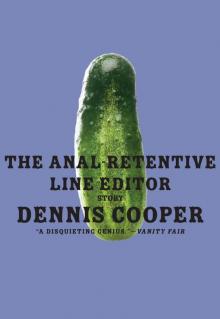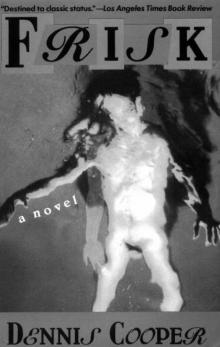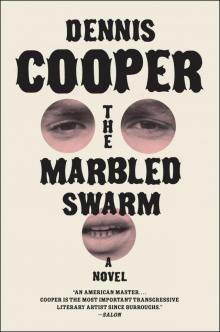- Home
- Dennis Cooper
The Marbled Swarm Page 10
The Marbled Swarm Read online
Page 10
Unlike my father’s other keepsakes, this effect lacked records pertaining to its upkeep, taxes, or estimated value, and was not officially among my father’s holdings, referenced only once and quickly in a handwritten note in one of the will’s supplementary pages.
First thinking it a pure example of my father’s riddles, the lawyer had halfheartedly typed a few search terms into Google and uncovered a solitary record of said property’s
existence—an item in the archives of the threadbare website of a razor-thin newspaper that served the nearest town.
Dated four or so years prior, the article sought to abridge a thickened curiosity among the town’s two dozen residents regarding a peculiar-looking building that was then under construction on its westernmost fringe.
Quoting some hireling at the construction site, this article revealed the odd contraption’s owner as a Parisian who bore my father’s name. Notwithstanding the in-progress building’s likeness to a theme park’s far-off satellite, it was instead a children’s playhouse, rooted there rather than in the owner’s yard due to its enormity.
Upon completion, the playhouse would huff and puff an illustration in some comic book or other into three usable dimensions and become a walk-in birthday gift for the owner’s younger son. Presumably, this boy would horse around within it on the weekends and over school vacations. Otherwise, it would gather dust and invite local teens’ graffiti.
Most outlandishly, the owner had bypassed the normal practice of employing an architect to coax the inky streaks and dashes into solid matter. Instead, a cosmetic surgeon had been asked to make that difficult transition. The aim of this unorthodox approach, or so the worker said he’d heard, was that the playhouse would be less the drawing’s souvenir or Disneyed offshoot than a twin of the unwrinkled thoughts behind it.
Wedged into one corner of the article was a low-resolution scan of the comic’s panel that had formed the building’s inspiration. My first impression, as I recall, was that the busy-looking, riotously structured prototype might have flourished in the wishy-washy first dimension, but it would surely topple at the onset of the first real breeze.
The only visible phone number on the website was in an ad noting a local florist, and so the lawyer dialed, reaching a loquacious woman who explained that, due to a recent fire, the flower shop was doubling as a pleasant-smelling city hall, and she was both a clerk and the town’s elected mayor.
Yes, she knew of the unearthly building he described. Although once the superstar of local gossip, she said, its mysteries had grown unfashionable, due mostly to the dwelling’s pitiable location off a barely traveled road that was, in truth, merely a driveway for the scattered homes along its edges.
However, not two weeks before the lawyer’s call, the nutty edifice had made a kind of comeback when a stranger and his two sons started shopping at the local lumberyard.
The stranger, whose name she thought she’d overheard as Christophe or maybe Kristof, told the lumberyard’s cashier his boys and he were houseguests at a manor in the area that he might know, at least by reputation, due to its unconventional façade.
Since that very lumberyard’s stock of sawed-up trees had fed the budding structure, the cashier had its preposterous beginnings and backstory at his fingertips, and he repeated what he knew, both to be neighborly and to sound the stranger out.
While the cashier’s tale was technically correct, the stranger said, it was also out of date. The building’s owner was deceased, and his beloved son had disappeared not long before he’d died, abducted, it was thought, by his nanny, who’d also vanished, and whom authorities believed had raped and killed the child for, well, whatever reason pedophiles do horrendous things.
In happier times, this boy had, for no doubt goofy purposes, drafted a will, and with such neat penmanship and official-sounding turns of phrase that this document was fully legal. In his will, the boy had specified that, should he die, his playhouse would be passed down to the genius who’d designed it, and that genius, as luck would have it, was the very man addressing the cashier.
At that point, the mayor announced she had a bird of paradise in need of potting, but she would get in contact with the lawyer should any further scuttlebutt develop.
By the time the lawyer folded his computer, I was staring at the desk it left behind.
In hindsight, I was sappy to have thought myself immunized against my father’s verbal daring-do, and to have blithely guessed that, as the only student of his tricks, I’d been plucked out of the audience, then put in charge of polishing his instrument.
For years, I had defined the marbled swarm to anyone who asked me why my father spoke in plusses as an over-stylization whose effect was no more threatening than the average villain’s phony Russian accent.
Imagine if he typed his half of every conversation, I would posit. His teeth would be the keyboard and his tongue a fingertip. His tone of voice would be the font—a strange idea, granted, and yet planes weighing tons are often airborne—and that font would be, say, Webdings or another logotype whose concept trumps its information.
At worst, I would suggest, were my father in a shifty mood or over-caffeinated, and if you were on his schedule, you might hear yourself repay a compliment on your attire and find you’d placed the winning bid on van Gogh’s Sunflowers, in effect.
That, in so many words, was how I thought I’d been instructed to employ this mannered spiel to which you’ve grown accustomed.
Hence, while I knew my father was a pompous, schmoozy motherfucker, I also saw the marbled swarm as hype against which he, the product, was overmatched, like, say, when Mel Gibson played Hamlet, which you might recall earned more money at the box office than every previous production of the play combined dating back to the seventeenth century, even though his version greatly displeased critics.
I’d been oblivious, or, to give myself a credit at which you are invited to balk, innocent—a kind of Robin who wasn’t wedded to uncley Batman but rather hypnotized into an unwitting shadow of the Dark Knight—a carrier of the family tradition no truer to my father’s grand designs than Alfonse’s imitations were to mine.
One afternoon, the gendarme charged with rescuing Alfonse or producing his dead body from thin air confided that, while the case itself remained an open book, or a chapbook at the very least, his gut would like to say the boy was 86 percent deceased at last count.
No sooner had I locked my door, leaned heavily against it, and phoned François to share this reason to relax than my father texted me an invitation to share a dinner in his loft, ostensibly to reengage with the routine of family meals that my brother’s predicament had discontinued.
As I was curious to know if, when sequestered with this most unavailable of parents, I might detect the hots I had assumed, or fantasized, if you prefer the God’s-eye view, he nursed for me, I abided by his offer, likely with a smiley face emoticon, knowing how he hated such abbreviations.
For much of this high-powered meal, which replaced his coffee table’s stack of Christie’s catalogs with tins of Chinese take-out, my father’s head, which I’ll remind you looked a little like Gérard Jugnot’s, starred the long face he had generally fastened to the world since my brother’s truancy had left it hassled.
My face, by contrast, flirted, or, to add some color, nibbled at the turnip cakes astride my crisscrossed chopsticks with the seeping breaths and narrowed, witchy eyes of a young Brigitte Bardot dabbing suntan oil onto her cleavage.
While these efforts earned my crotch some cross checks and a throat clearance or two, our repartee itself maintained a roar of chews and gulps until my father deigned to ask about my day in the most bored voice you can imagine.
“Have you not observed, heard, and recorded for posterity enough of me already,” I asked. “Perhaps my opinion of the Balenciaga shirt I bought this morning or a playlist of the new Muzak at Colette would sate the completist in you?”
As much as I would love to overrule some chums who�
��ve called my voice a kind of fancy drainage ditch through which my brilliant father’s voice forever sloshes and evaporates, to ask myself to replicate his words verbatim would be like asking you to travel to Miami on the broken champagne bottle that baptized the ship that could have sailed you there in style.
Still, feel free to test what you’ve imagined the first printing of the marbled swarm entailed by clotting and annexing the phraseology that fills my cheaper trade edition.
In so many words, my father said that, were I to share this shopping trip with him, there was a chance his latent curiosity about the rue St. Honoré scene might be tweaked, although less by what I chose to say than by my belief that he would even be half listening.
“You will forgive me if I fall back on a gesture any idiot my age might employ against his elders,” I said, “but, to quote and qualify Rimbaud, I might defy you to prove that I do not contain multitudes.”
My father said the reason I was taught the marbled swarm would be no different had he handed me a signed blank check and said, Here, make me penniless.
In fact, it was specifically to grant my squandered chance a second stimulus that he’d lighted into an experiment, which he understood François had slipped to me in crib note form and that he guessed I would expect him to substantiate.
I’ve edited the one-way conversation that ensued into a draft mundane enough to reach you, and while my text is surely not the half of his, it offers everything I understood. So, if the pages just ahead seem full of secrets and you notice them, I can tell you that I haven’t, and any mindfucks are his.
One day, he said, he was hammering a Wim Delvoye untitled tattooed pigskin he’d recently acquired onto a wall in our old mansion when the nail flew through what he had incorrectly guessed would be a stubborn stretch of bricks.
When he’d withdrawn the nail, the tiny hole had emitted a veritable whistling wind, causing him sufficient wonder that he took to smashing it into a craggy maw through which he eventually inserted most of his head.
He surfaced not plugged into the wall itself but comfortably surrounded by what looked to be a secret room. After gutting the partition, he was able to climb inside this chamber with a flashlight, whose veering beam exposed a door, crudely hacked and with an archway so low-set it seemed to date from when Napoleon was not the dwarf we think today.
Naturally, my father ducked and entered, and, to save us time, discovered that the room was one of dozens that composed a crooked, hypodermal secondary house that interlaced the mansion’s lodgings the way a tree’s branches will twist and turn beneath their foliage.
A phone call to the former owner elicited a round of drinks, which lubricated a confession that, yes, he’d withheld the secret tunnels out of fear that, were the building’s history to be included in the price, it would then be stained with disrepute, and he could never have retrieved his original investment.
He explained that in the 1930s, a man named Arval Benicoeur had resided in the mansion. Benicoeur was a notorious figure at that time due to claiming he had found the Marquis de Sade’s infamously lost novel, L’Egarement de l’infortune. Sade had only undertaken L’Egarement to re-create Les 120 journées de Sodome, now his most commended work, which he’d written while confined in the Bastille and believed until his death had vanished in the prison’s hasty if much celebrated storming.
Upon Sade’s death, his moronic kin had burned the only copy of L’Egarement, causing every ersatz bookworm since to hope they’d been misquoted. It was this fabled manuscript that Benicoeur “discovered” in the very hidden passages my father had unearthed.
Shortly after making his outrageous boast, Benicoeur had disappeared, and a subsequent investigation of his abandoned house found no sign of the manuscript, much less the secret area from which he supposedly had dredged it.
Perhaps a dozen years later, a family by the name of Roux, who owned the mansion at the time, had a domestic spat. Things were thrown about, and something bashed a bedroom wall, and, thus, the house within the house had been accounted for.
Deep within it, a desiccated corpse bearing Benicoeur’s distinctive nose was hanging by a noose. Parked against the walls around him, partially disassembled and locked in strange, tricycle-like positions, were fifteen skeletons, sized like children, each one showing evidence of tortures that appeared to match scenarios from Sade’s extremist fiction.
Overflowing from a trash can near Benicoeur’s shriveled feet were the wadded pages of a novel, written in an archaic form of French and scratched out with a feather pen that Sade could easily have used to chart his timeless horrors.
Ironically, this forged manuscript, the obsolescent pen, and any evidence of Benicoeur’s crimes were victims of the fire that vaporized the archives of the Hotel de Ville in 1957, which was why his infamy was just a tidbit stuck on certain blogs and Facebook groups maintained by self-styled Sadeians.
Although this story had unnerved him, my father lacked the incredulity to seal the cursed tunnels. He’d kept them secret from his children not because he feared they’d give us nightmares, but because we might, if playing on the steep floors, break our little necks, and he’d only kept his wife out of the loop because the tunnels thrilled some women whom he fucked behind her back.
Once puberty had spiced me up and Alfonse could walk without gripping someone’s pants leg—in other words, once we’d devised something akin to private lives—my father said he found himself shortening his time in our domain into a cameo, preferring to observe us more obliquely through the tunnels’ wealth of peepholes.
One afternoon when we looked boring, and when my father had neglected to bring a book, he killed time by recollecting snatches of his childhood, notably his attendance at a performance, perhaps the very last, by a famous, then elderly French magician, to which my grandparents had brought him for his birthday.
The magic show featured numbingly familiar tricks to do with card decks, top hats, scarves, a scantily attired assistant sawed in two, and so forth, which the magician enacted with a certain itemized grace for which he’d been revered.
At some point, he’d made a showgirl vanish for several minutes. While her reemergence rolled my father’s younger eyes, he said he’d felt disturbingly unworried while her disappearance was an issue.
Instead, he’d wondered what she would be thinking, poised backstage, he guessed, surely peeking through some curtain slit, waiting for her cue, watching strangers’ eyes shred the stage in search of her, knowing that, in her nonexistence, she was briefly more important than the billion times more popular magician.
While my father thought the fad among psychologists of tracing clients’ biases to childhood traumas was too Sherlock Holmes, he agreed that, while in the throes of this memory, he’d tagged that magic trick as the most likely animator of his wish to speak not in collegiate sentences, per se, but through fissures in a sonic curtain sewn from sentences’ components.
For perhaps a year, the tedium with which Alfonse and I turned pages or made peculiar faces at cartoons managed to addict him, an entrancement he surmised had been related to his fondness for snail-paced French cinema of the early ’70s.
But when our mother died so flashily while he was taxiing to CDG, the lack of impact from that ill-timed trip, and his newfound fear of missing anything again, had worked its offshoots into everything I saw around me, and that included who I thought I’d looked at in a mirror.
“If I might meddle in your indiscretions,” I said carefully, “my current thought is that your purging lacks a certain moxie, perhaps owing to a qualm regarding sex talk and its hazards vis-à-vis the marbled swarm—a mismatch that, in my experience at least, causes me to no more speak my mind to listeners than one gives one’s car to a mechanic.”
To the contrary, my father said, he was guiding me behind his scenes in hopes of rescuing my theories from François’s typically ribald interpretation.
He asked me to imagine he was the Paris Opera House. The time would be a
century ago, and his voice the sound of Hector Berlioz conducting Symphonie fantastique once it had wafted through the lobby then fragmented in the ears of two bystanders lacking tickets, one a dedicated fan, who would represent myself, the other a spiteful peer of Berlioz, who would represent François.
As would be the case with any man whose closest friends were inevitably fathers of an adolescent son who wasn’t wildly overweight, François’s attentiveness whenever Alfonse was a noun could not be termed an act of listening but of meddling with his ears.
François was, to generalize, a kind of sex-crazed doppelganger of those crackpots in America who can’t watch plates leave a waiter’s hands without proclaiming that, if not for a government cover-up, they would have been UFOs.
“You’ll pardon me,” I said, “if I turn to a linguistic device I believe we both find favorable and less pose a question than construct its inner compound.
“If what you say is so, why would you cast the role of nanny as though Alfonse’s need for laundered clothing was less realistic than a porn star’s need for pizza delivery boys. Then there’s the matter of your microscopic interest in my . . . let’s say bedtimes, such that, when sharing your transcriptions with François, you quoted lines I surely wheezed more than enunciated and which must have barely swirled above my parted lips.”
In this regard, my father said, I would need to choose between the flattery-cum-dispatch of François, who, he reminded me, was a chef prized for twisting honest, homely plants into forty-euro entrées, and his own confession, which was admittedly self-serving and, for that reason, as truthful as a poem is to its glazed-over scribe.
Still, as I seemed so inordinately smitten with the dirty lyrics in François’s distorted cover version, he said he would expose one further fraction.
Yes, he’d fattened up our lofts with undisclosed locations and honeycombed the walls with lenses, but his experiments, and their sexual thematic in particular, were not the same fact-finding missions he’d undertaken in the mansion’s less sophisticated setup, but . . . attempted murders, and when he’d zoomed into our crotches he might as well have lengthened the exposure until we whitened into nothingness.

 I Wished
I Wished Try
Try Period
Period The Anal-Retentive Line Editor
The Anal-Retentive Line Editor Frisk: A Novel (Cooper, Dennis)
Frisk: A Novel (Cooper, Dennis) The Marbled Swarm
The Marbled Swarm